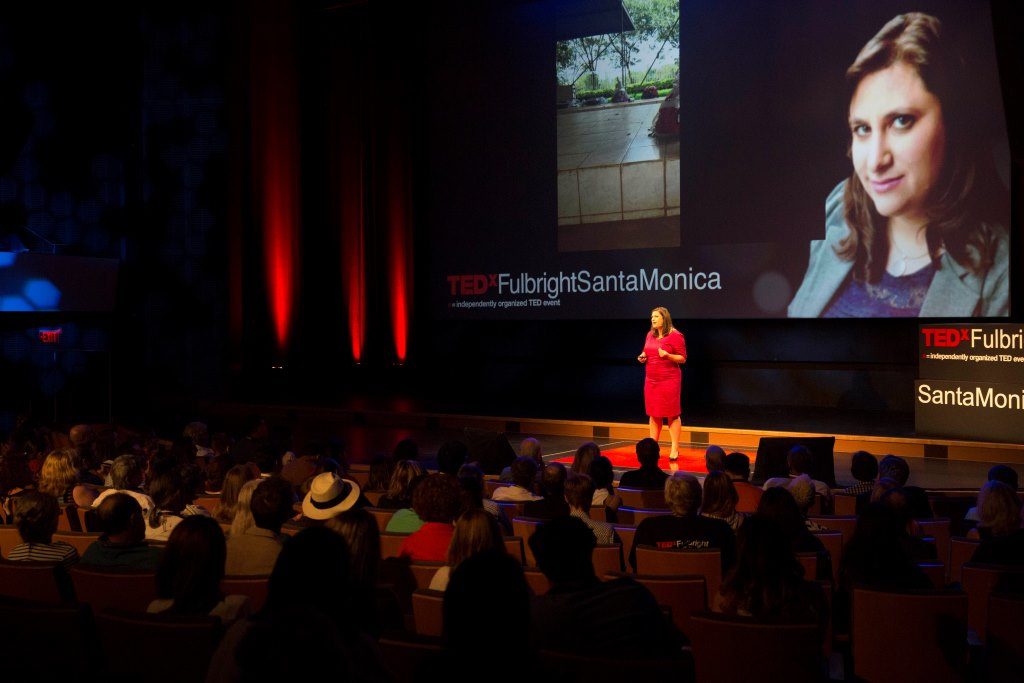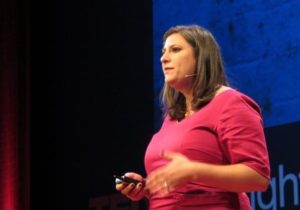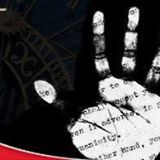
Samantha Lakin, a doctoral student at the Strassler Center for Holocaust and Genocide Studies at Clark University, channeled years of research and the voices of survivors during a heartfelt TEDxFulbright talk, where she joined selected Fulbright scholars from around the world who are recognized for fighting prejudice, ignorance, and intolerance.
Lakin, of New Jersey, participated in TEDxFulbright on September 26 at The Broad Stage in Santa Monica, California. Her talk, “Survivors speak: Exploring stories of genocide and justice after conflict,” questioned how a society can recover after genocide. She spoke before an audience of 500 about genocide, justice, and dignity, and especially focused on her intimate work with survivors of the 1994 Genocide in Rwanda.

Lakin opened her TEDxFulbright talk by recounting — in the survivor’s own words — the rescue story of Bernadette, a member of the persecuted Tutsi group who spent a month in hiding during the notorious genocide that ravaged Rwanda in 1994 and saw nearly 800,000 individuals killed in 100 days. Lakin learned Bernadette’s and many others’ stories during five research trips to Rwanda, most recently in summer 2015. In her talk, she spoke about the physical and emotional scars borne by survivors, many hidden and deep.
“How can we help a society recover after such a genocide?” Lakin asked. One answer she offered to the audience was “access to justice.” But, she continued, the need is for justice beyond the ordinary and legal sense. Lakin’s continuing work is about looking beyond justice that focuses only on perpetrators and punishment and, instead, focusing on victims and survivors through a lens of empathy, validation and listening to local voices. “We don’t have to have survived genocide to know that these types of symbolic justice are just as important to us as human beings,” she said.
Watch Samantha Lakin’s TEDxFulbright Talk “Exploring Stories of Genocide and Justice after Conflict”
Preparing for the TEDx talk was difficult, Lakin said, and especially personal. “I wanted the audience to feel like they were there with me, in Rwanda, while I was meeting survivors, attending commemoration events, and working in the country — a place where most of the audience members had never been or imagined.
“It was overwhelming to have all eyes on me, and not even to hear a single breath or movement from the audience. In the end, the talk was well received, and people were moved by it,” she continued. “Some even cried. TedXFulbright was an amazing experience and opportunity for me to share my voice and my ‘fight worth fighting’ with the world.”
Lakin’s research for the Strassler Center focuses on transitional justice in post-conflict societies, with Rwanda as her main fieldwork site. She received an M.A. at The Fletcher School of Law and Diplomacy, Tufts University, and holds a B.A. from Brandeis University in International and Global Studies, Politics, and French. She is a Nathan Cummings Foundation Fellow and was a Fulbright scholar to Switzerland, a grantee with the National Endowment for the Humanities, and has worked on gender issues at the World Health Organization. She has presented original research at international conferences, including the University of London, The International Institute for Holocaust Research at Yad Vashem, Jerusalem, the Museum of Tolerance New York, and the International Society of Political Psychology. She also served as a consultant for the Kigali Genocide Memorial and Aegis Trust in Rwanda, and serves on the Board of Trustees for two NGOs working with survivors of genocide, Survivors Fund (SURF) and the Genocide Survivors Support Network.
In closing her TEDxFulbright talk, Lakin said: “Genocide, memory and justice do not a have a concrete ending, rather, they have a lasting impact. If we expand our perception of justice and truly listen to those who are marginalized, then the hopes and aspirations that we all have — of unity and peace — can become a reality.”
 Established in 1977, the Fulbright Association is a private, nonprofit and nonpolitical organization whose members are Fulbright Program alumni and friends of international education. The Association supports and promotes international educational and cultural exchange, and mutual understanding among the peoples of the world. Genocide, mass atrocities, crimes against humanity and their prevention stand at the core of the Strassler Center for Holocaust and Genocide Studies. Home to a uniquely rich undergraduate program and a landmark doctoral program, the Strassler Center is the first and only institute of its kind. Since it was established in 1998, it has gained international standing as the sole program to train students for Ph.D. degrees in Holocaust History and Genocide Studies.
Established in 1977, the Fulbright Association is a private, nonprofit and nonpolitical organization whose members are Fulbright Program alumni and friends of international education. The Association supports and promotes international educational and cultural exchange, and mutual understanding among the peoples of the world. Genocide, mass atrocities, crimes against humanity and their prevention stand at the core of the Strassler Center for Holocaust and Genocide Studies. Home to a uniquely rich undergraduate program and a landmark doctoral program, the Strassler Center is the first and only institute of its kind. Since it was established in 1998, it has gained international standing as the sole program to train students for Ph.D. degrees in Holocaust History and Genocide Studies.


